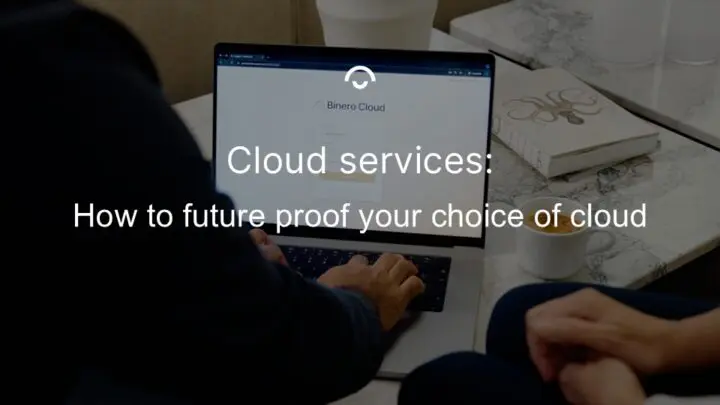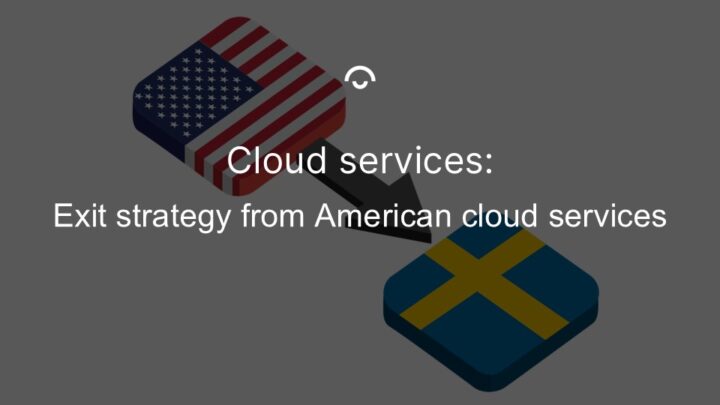Best cloud service for businesses
— we help you choose the right one
This is a detailed overview of the various cloud services available for businesses. Find out more about what sets the services apart, what needs they meet, their advantages and disadvantages, and what you need to consider in order to choose the best cloud service for your particular business.
- Article
29 September 2025
What is the best cloud service for businesses? That depends on many factors, not least your needs and goals. To find the right cloud solution that gives you the flexibility, security and features you need to compete in a rapidly changing market, you need to understand what the different cloud services can do for you.
Here we explain what sets them apart, their advantages and disadvantages, who they are suitable for, and what you need to consider so that you can choose the best cloud service for your business.
Public Cloud and Private Cloud
Depending on your needs, you can choose between cloud services in a public or private cloud. Public Cloud means that cloud services are provided by a supplier where the infrastructure is shared between several different customers. The supplier is responsible for the operation and maintenance of all hardware and infrastructure, such as servers, storage and networks.
As a customer, you purchase the resources you need and only pay for what you use. This is a very common solution for companies that want to get started quickly without having to make large investments in infrastructure. For example, for development and testing environments, backup and recovery, distributing applications, media services and websites, etc.
The shared resources of a public cloud are not always the most suitable solution for a company's cloud needs. In cases where an organisation handles highly sensitive information (e.g. military, healthcare and finance) with very strict security and compliance requirements, a dedicated infrastructure may be necessary.
Private Cloud provides users with a cloud service where resources are not shared with others. A private cloud offers much higher security, but costs more, is not as scalable as Public Cloud and requires more technical expertise.
IaaS - Infrastructure as a Service
IaaS is a basic cloud service where you rent the IT infrastructure you need from a cloud provider. The provider is responsible for servers, networks, storage, security, operation and maintenance.
- As a customer, you own the operating system, applications and data, and have full control over how they are used. IaaS is ideal if you need a modern and scalable development infrastructure without having to purchase and operate it yourself. It allows you to quickly get started building your own apps and IT solutions.
- The advantages of IaaS are that you can easily increase or decrease resources depending on your needs. You also only pay for what you use and get better control over costs.
- You have full control over your systems, applications and configurations. The provider handles everything related to security, redundancy, operation, etc., so that you can focus entirely on your needs and services. However, you are responsible for the security of your data and systems, as well as ensuring that they are correctly configured.
- This requires IT expertise within your organisation. If you lack this expertise, other cloud services may be more suitable for you, depending on your needs.
PaaS - Platform as a Service
PaaS is a slightly simpler cloud service than IaaS. You not only get the infrastructure, but also a ready-made platform in the cloud for developing and running applications. It is probably the best cloud service for companies that mainly want to work with writing code.
- You focus entirely on the application, while the provider takes care of everything else so that you don't have to configure or manage the infrastructure. This gives you faster development, lower complexity and good scalability, as the platform scales automatically depending on the load.
- A perfect cloud service for those who want to launch their projects quickly, or who have an agile approach with rapid development and testing.
- PaaS generally has lower operating costs than IaaS because much of it is handled automatically. Depending on the provider, integrated development tools, CI/CD, API management and debugging tools may be included in the service.
- As with IaaS, you are still responsible for application security, authentication and encryption, even though the provider manages the surrounding security.
- PaaS also gives you less control than IaaS, as you do not control the operating system or infrastructure and have limited freedom to configure. If that is not a concern, however, it may be the best cloud service for your business if you want to focus entirely on development.
SaaS - Software as a Service
The simplest form of cloud service. You can use a ready-made application without having to install, maintain or update the technology behind it. Everything is handled by the provider; you just need to log in and use the service. Think Microsoft 365, Salesforce or Fortnox.
SaaS is probably the best cloud solution for companies that need to get started quickly with standard features and want to have as little to do with IT operations and maintenance as possible. SaaS is usually based on a per-user or per-month payment model, and you can easily add more users as needed.
With this cloud service, you as a user do not need to think about anything except how to use it. The disadvantage is that you are usually completely at the mercy of the provider. It is usually difficult to customise the functions, you have little control over the data handled by the provider, and it can be challenging if you later want to migrate to another service. But if you have simple flows and needs, and want to think as little as possible about IT, this is a very simple and convenient cloud solution.
What should I consider when choosing the best cloud service for my business?
✓ The right cloud service depends on your needs. Always start by defining what you will use the cloud solution for. Is it for data storage and backup, to get a flexible infrastructure without your own investments, to get a platform and tools for development, to get access to higher security than you can achieve yourself, or something else? Also consider your needs regarding which systems and data will be managed in the cloud, as well as performance, availability and reliability.
✓ What is the security level of the cloud service? What type of data will you be storing and managing in the cloud, and does it need to comply with regulations such as GDPR? Does the provider have the necessary certifications, such as ISO, SOC, etc.? How do security features such as encryption, access control and backup work? Also find out who is responsible for what – security risks may arise if it is unclear what is your responsibility and what is the provider's responsibility.
✓ How scalable is the cloud solution? Does the service keep up when you need more resources? What are the costs when you need to scale up?
✓ What does integration look like? Does the cloud service work well with your existing systems? Are there APIs, and what is their capacity? Is it possible to work with automation that can save time, ensure quality and reduce the risk of duplication?
✓ Is there an SLA (Service Level Agreement) in place? A formal document that defines and ensures what you as a customer can expect from the provider in terms of performance, operation, security and support gives you greater security and clarity in the cloud service you choose.
Bineros cloud services
At Binero, you get easy-to-use and highly secure Swedish cloud services that suit all your needs. In addition to colocation, where you rent your own servers in our data centre, we offer a wide range of cloud services within IT, and you can get both infrastructure (IaaS) and platform (PaaS) as a service depending on your needs and goals. This allows you to scale freely and flexibly in a cloud environment that is stable and secure. In addition to Public Cloud, we can also offer Private Cloud if you want your own environment.
We have our own data centre with our own staff outside Stockholm. This means that all data stored with us is handled exclusively within Sweden and complies with Swedish legislation and GDPR. We are also ISO 27001 certified and meet the highest standards for information security and the high requirements for compliance and data integrity.
We are close to you and are as much a partner who guides you in the right direction as we are a stable provider of secure cloud services. Let us take care of the technology, operations and security so that you can focus entirely on your business and get the best cloud service for your company.
Contact us and we will tell you more about our cloud services for businesses!


